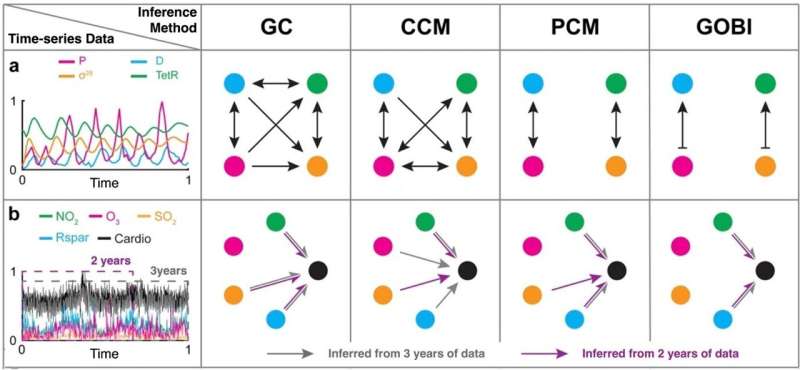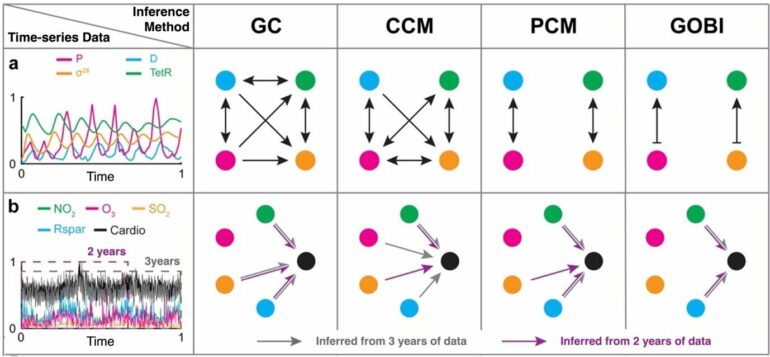In the quest to unravel the underlying mechanisms of natural systems, accurately identifying causal interactions is of paramount importance. Leveraging the advancements in time-series data collection through cutting-edge technologies, computational methods have emerged as powerful tools for inferring causality.
However, existing model-free methods have struggled to differentiate between generalized synchrony and causality, leading to false predictions. On the other hand, model-based methods, while accurate, have been limited by their dependence on specific models, hindering their widespread applicability.
Addressing these challenges head-on, a team of researchers from the Biomedical Mathematics Group within the Institute for Basic Science (IBS) has developed a computational package called General Ode Based Inference (GOBI). This innovative tool overcomes the limitations of both model-free and model-based inference methods by introducing an easily testable condition for a general monotonic ODE (Ordinary Differential Equation) model to reproduce time-series data. The work is published in the journal Nature Communications.
Dr. Kim Jae Kyoung, the lead researcher behind GOBI, explains, “Our goal was to create an accurate and broadly applicable inference method that could unlock insights into complex dynamical systems. We recognized the limitations of existing approaches and set out to develop a solution that could overcome these challenges.”
GOBI goes beyond the capabilities of traditional model-free methods, such as Granger Causality, by successfully inferring positive and negative regulations in various networks at both the molecular and population levels. Unlike its predecessors, GOBI can distinguish between direct and indirect causation, even in the presence of noisy time-series data.

Comparison of causal inference results between the developed methodology (GOBI) and existing model-free methods (GC: Granger Causality; CCM: Convergent Cross Mapping; and PCM: Partial Cross Mapping).(a) When combining two unrelated time-series data from prey-predator systems (P and D) and intracellular protein interaction systems (σ^28 and TetR), existing methodologies such as GC and CCM tend to erroneously infer causal relationships between nearly all components when there is synchrony in the time series data. However, GOBI accurately infers only causal relationships that actually exist.(b) Time-series data presents the hospital admissions for cardiovascular diseases and concentrations of air pollutants in Hong Kong. Unlike other methodologies, GOBI correctly identifies that only nitrogen dioxide (NO2) and respirable suspended particulate (Rspar) have an impact on cardiovascular disease, regardless of the length of the data used (two or three years). © Institute for Basic Science
Park Seho, the first author of the paper, said, “GOBI’s strength lies in its ability to infer causal relationships in systems described by nearly any monotonic system with positive and negative regulations, as captured by the general monotonic ODE model. By eliminating the dependence on a specific model choice, GOBI significantly expands the scope of inference methods in complex systems.”
In addition to its powerful inferential capabilities, GOBI offers user-friendly features that simplify the computational process. The researchers have designed the package to be accessible to a wide range of users, including those without extensive computational expertise. Through GOBI, scientists and researchers can gain deeper insights into gene regulatory networks, ecological systems, and even understand the impact of air pollution on cardiovascular diseases.
The researchers have validated the effectiveness of GOBI by successfully inferring causal relationships from synchronous time-series data, where popular model-free methods have faltered. By providing accurate and reliable inference in a variety of scenarios, GOBI paves the way for a more comprehensive understanding of complex dynamical systems.
With its groundbreaking capabilities, GOBI promises to revolutionize the field of computational causal inference, empowering researchers to unlock the secrets hidden within complex systems. As the scientific community embraces this powerful tool, we can anticipate unprecedented advancements in various domains, including biology, ecology, and epidemiology.
More information:
Se Ho Park et al, A general model-based causal inference method overcomes the curse of synchrony and indirect effect, Nature Communications (2023). DOI: 10.1038/s41467-023-39983-4
Provided by
Institute for Basic Science
Citation:
Introducing GOBI: A breakthrough computational package for inferring causal interactions in complex systems (2023, July 25)



